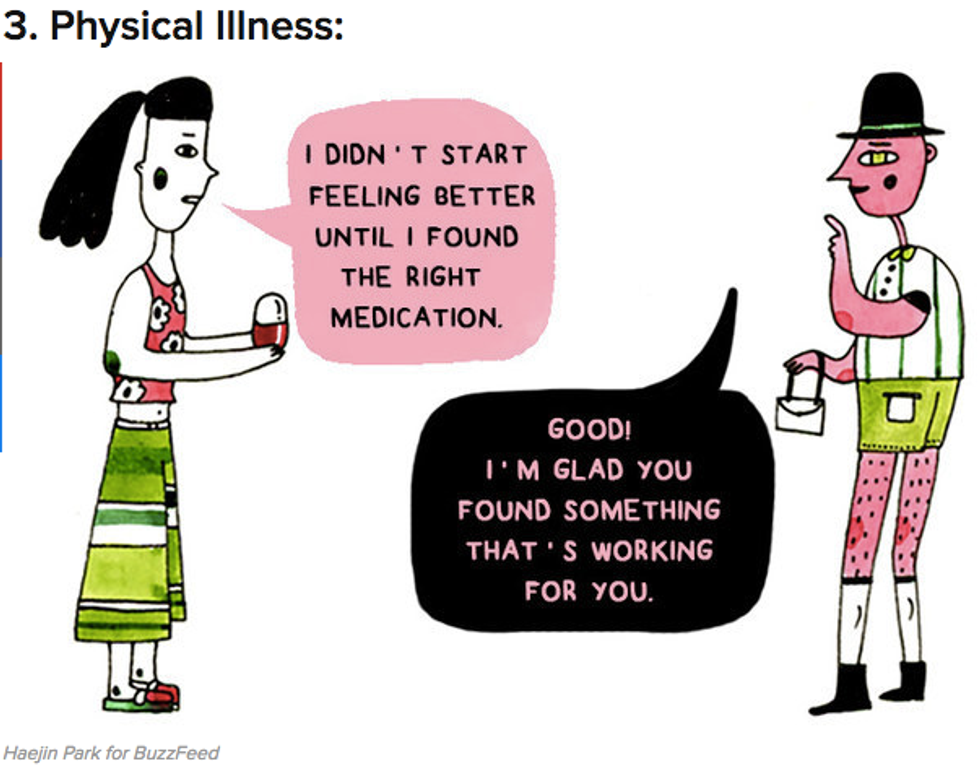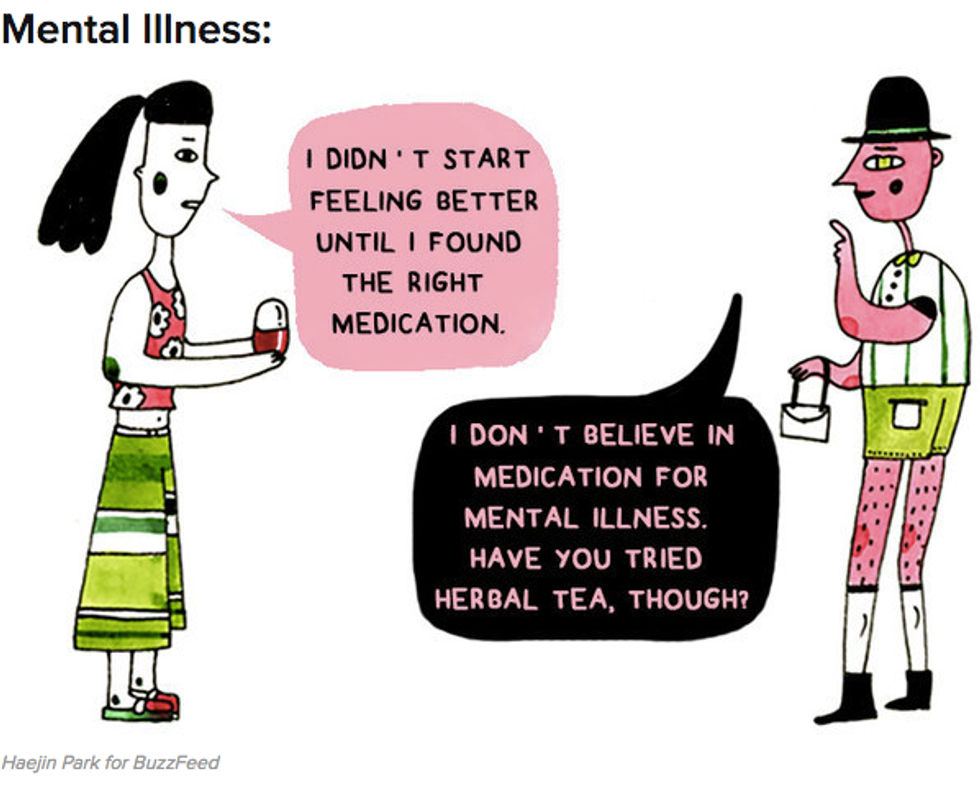Since the third grade when I first learned about Eating Disorders, I have honestly lost track of the number of times I have been called "Anorexic" by one of my peers. By sixth grade, I was convinced I was supposed to be Anorexic and actually stopped eating for two days in an attempt to keep up the impression that I was.
I have never been diagnosed as Anorexic or have actually exhibited any actual signs or symptoms of Anorexia. As children, we learn about (sort of, at least) and hear words like "anorexic," "depressed," "bipolar" from our older counterparts, and adopt them into our vocabulary. We hear them not just as illnesses, but as adjectives too.
Words that are legitimate mental health concerns being tossed around as adjectives is more minimizing than I think we like to realize. I mean, when's the last time someone said "wow, you're so AIDS," or "That's total MS" in casual conversation? Oh wait. Probably never.
The stigma around mental health is negative enough:
So when we call a skinny person Anorexic, not only does that completely minimize the severity of the disease, it is incredibly offensive and honestly ridiculous.
I just want to point out the difference between how we often use mental illnesses as adjectives in casual conversation, and then compare that to what it actually means...
Adjective: Often used to describe someone or something that is sad.
"Jenny's been actually so depressed since One Direction split up, she like needs to get over it."
Actual: Depression is a common but serious mood disorder. It causes severe symptoms that affect how you feel, think, and handle daily activities, such as sleeping, eating, or working. To be diagnosed with depression, the symptoms must be present for at least two weeks.
"I'm a little worried about Jenny. She has been sleeping a lot these past few weeks and hasn't been leaving her room. Her roommate told me she has been skipping class too and not eating."
Having a Panic Attack
Adjective: Basically used instead of "freaking out."
"OMG Debbie, like, stop having a panic attack and chill out."
Actual: A panic attack is a sudden episode of intense fear that triggers severe physical reactions when there is no real danger or apparent cause. Panic attacks can be very frightening. When panic attacks occur, you might think you're losing control, having a heart attack or even dying.
"We were sitting in class and all of a sudden Debbie started hyperventilating and shaking. People kept asking her what was wrong over and over again but she wasn't saying anything - I think she just wanted someone there to comfort her."
Bipolar Disorder
Adjective: Commonly tossed around whens someone is happy one day and not-so happy the next day.
"John is in such a bad mood today, I swear he is bipolar or something."
Actual: Bipolar disorder, also known as manic-depressive illness, is a brain disorder that causes unusual shifts in mood, energy, activity levels, and the ability to carry out day-to-day tasks.There are four basic types of bipolar disorder; all of them involve clear changes in mood, energy, and activity levels. These moods range from periods of extremely “up,” elated, and energized behavior (known as manic episodes) to very sad, “down,” or hopeless periods (known as depressive episodes). Less severe manic periods are known as hypomanic episodes.
"The last two weeks John was very energetic, he was talking a mile a minute, I could barely keep up! He was so excited about a lot of new ideas he had for work, too. Now this week he has been very to himself and hasn't been excited about anything, even things he usually is about. Now that I think of it, this has been happening like this the past few months."
Schizophrenia
Adjective: Used to describe someone who is maybe a little out there or "looney."
"I am so spacey, I swear I am schizophrenic."
Actual: Schizophrenia is a chronic and severe mental disorder that affects how a person thinks, feels, and behaves. People with schizophrenia may seem like they have lost touch with reality. Although schizophrenia is not as common as other mental disorders, the symptoms can be very disabling.
Hoarding Disorder
Adjective: Used to describe someone who might be a bit of pack-rat.
"I went to visit my friend in Florida and I found all this random stuff that she had shoved in a drawer from middle school, she is such a hoarder!"
Actual: Hoarding disorder is a persistent difficulty discarding or parting with possessions because of a perceived need to save them. A person with hoarding disorder experiences, distress at the thought of getting rid of the items. Excessive accumulation of items, regardless of actual value, occurs.
"I went over to my friend's house the other day for the first time in a few years and I am really concerned. I could hardly get in the front door so I had to go in through the back one in the kitchen - but that wasn't much better. She had pots and pans littering every surface and rotten food everywhere. I went looking for her cat and couldn't find her - but noticed that she'd been using the house as a litter box. My friend didn't seem at all concerned by her living situation. I went to use the bathroom while I was there and noticed that the bathtub was full of old ratty clothes, newspapers, and other items. I suggested we throw out some of the items and she broke down in tears, completely hysterical."
Obsessive Compulsive Disorder (OCD)
Adjective: Often used to describe someone who is orderly.
"My OCD is so bad, I like to color code my closet it's so crazy!!"
Actual: Obsessive-Compulsive Disorder (OCD) is a common, chronic and long-lasting disorder in which a person has uncontrollable, reoccurring thoughts (obsessions) and behaviors (compulsions) that he or she feels the urge to repeat over and over.
"I can't leave my house in the morning until I eat breakfast and feed the dog, and then go around to all of the appliances in the house to make sure they are unplugged and off. I have to plug them in first, just to make sure I didn't miss one. Then I have to brush my teeth. If I brush my teeth before I start checking the appliances I have to start all over again."
Post Traumatic Stress Disorder (PTSD)
Adjective: Often used jokingly to describe a situation that wasn't particularly pleasant that you are finding yourself in again.
"I met this guy on Tinder and he does that stupid thing that my ex-boyfriend did that drove me nuts, ugh it's giving me PTSD."
Actual: PTSD is a disorder that develops in some people who have experienced a shocking, scary, or dangerous event. It is natural to feel afraid during and after a traumatic situation. Fear triggers many split-second changes in the body to help defend against danger or to avoid it. This “fight-or-flight” response is a typical reaction meant to protect a person from harm. Those with PTSD will often experience flashbacks or have "bad dreams" regarding the triggering event. People who have PTSD may feel stressed or frightened even when they are not in danger.
"My boyfriend and I were in a car accident last year and we were both seriously injured. Since then I am having a hard time getting in a car and keep having flashbacks of the crash, even when I am sleeping and wake up in a panic."
Alcoholism
Adjective: Used to describe someone who drinks a lot.
"Patty drank every day this week pretty sure she is basically a functioning alcoholic."
Actual: Alcoholism is a disease characterized by the habitual intake of alcohol. The definition of alcoholism is chronic alcohol use to the degree that it interferes with physical or mental health, or with normal social or work behavior.
"I'm a little concerned about Patty. The past few months I haven't seen her without a drink in her hand, and she always seems to be a little buzzed, even when I'd run into her at the grocery store or even right after work. I asked her husband if he thought Patty's behavior was strange and he didn't seem to want to talk about it."
Anorexia Nervosa
Adjective: Used to describe someone who is skinny.
"Eat a goddamn cheeseburger Allie, you are so anorexic."
Actual: Anorexia nervosa is characterized by emaciation, a relentless pursuit of thinness, a distortion of body image and intense fear of gaining weight, and extremely disturbed eating behavior. Many people with anorexia see themselves as overweight, even when they are starved or are clearly malnourished. Eating, food, and weight control become obsessions for people with anorexia.
"Allie's eating habits have changed a lot these past few months. Whenever we are all eating lunch she always says she'll "eat later" and I noticed she's been wearing thick sweaters and long pants even though it's summertime."
I'm not going to pretend to be an expert on any mental health disorder, or expect you to be, or to be "politically correct" all the time. #NobodysPerfect as Hannah Montana would say. But I think we are all guilty of throwing around phrases like "I have PTSD" a little too often and make jokes about our friends being functional alcoholics when in all reality it's just syllabus week at college. But I hope at the very least this was food for thought, and that you'll think twice next time you want to say (or you hear someone say) that they're going to have a panic attack about the dining hall being out of brownies.























